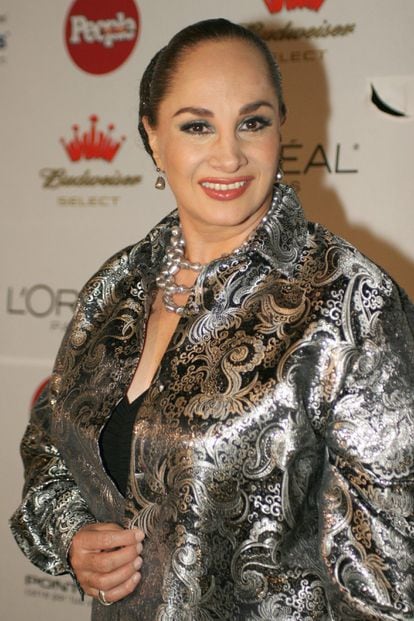Mexican actress Susana Dosamantes with John Wayne, in a still from 'Río Lobo' (1970), by director Howard Hawks. CBS via Getty Images
It is the years after the American civil war: a story of revenge, train robberies and duels with silver revolvers.
On the screen, John Wayne, Jorge Rivero and Jennifer O'Neill break the quiet of the night on horseback.
They need a place to rest.
A young woman with brown hair and a marked accent enters the scene and opens the doors of her house for them.
The film is
Río Lobo
(1970), a classic western
from iconic director Howard Hawks;
the woman who welcomes Wayne and his companions, the Mexican actress Susana Dosamantes.
The interpreter lived her glory days: a role in Hollywood at the hands of Hawks, magazine covers, her fame in her native country and the nickname "the most beautiful face in Mexico".
A year later her daughter, pop star Paulina Rubio, would be born.
Last week, at the age of 74, her children announced that Dosamantes had pancreatic cancer, one of her most aggressive.
He was born in Guadalajara in 1948, with a name more appropriate for saints than for a film career: María del Perpetuo Socorro Guadalupe Susana Dosamantes Rul Riestra.
In an exercise in language economy and personal
marketing
, she pruned what was left over and kept a much more suggestive version: Susana Dosamantes.
Back then, Jalisco was still a predominantly rural state, offering few opportunities for an aspiring actress.
She moved to Mexico City and in 1968 she participated in her first film, an adaptation of the novel
Los memorias del porvenir
, by the emblematic writer Elena Garro.
For that role, she won the Diosa de Plata award, an award given by the Association of Film Journalists of Mexico.
Mexican actress Susana Dosamantes, mother of singer Paulina Rubio, in 2005. ZAYRA MORALES (EFE)
The photos of the time reveal a black-and-white face, with hard features and a serious look that looks like something out of a
Sergio Leone
spaghetti western .
In 1975 she starred alongside Claudia Islas, Helena Rojo and Lucía Méndez in her most remembered film,
Más negro que la noche
, a film by Mexican director Carlos Enrique Taboada, known for her suspenseful works.
The plot is already a subgenre of horror movies: four women move into an old mansion that one of them has inherited, where supernatural events begin to occur.
The interpretation of Dosamantes earned her one of her most successful moments among the public of her country.
Throughout her career, she has participated in more than 60 movies and soap operas, in addition to a good handful of plays and commercials.
Like other actresses of her generation, she found a commercial niche with more audience success in telenovelas.
From his first,
Italian girl comes to get married
(1971), to the last in which he participated,
If they leave us
n (2021), he has embarked on more than twenty titles of all colors, of greater and lesser budget .
In 1990, with her role in
Dying to Live,
she won the award for Best Antagonistic Actress at Premios TVyNovelas, a Televisa gala that celebrates her company's productions.
Although her most remembered role in a soap opera came with
Amalia Batista
(1983), in which she played a woman trying to win back the love of her two daughters after a lifetime in prison for self-defensely murdering an abusive husband.
A drama of those who like on the desktop, which only lasted a year, but added 265 episodes that elevated Dosamantes as a star of the small screen.
Away from the scandals and excesses that usually accompany the careers of soap opera performers, Dosamantes always tried to keep a low media profile.
Her first marriage (1969-1974) was with a Spanish lawyer, Enrique Rubio, with whom she would have two children: Enrique and Paulina, who years later would become a pop star, she herself, also famous for the controversies of she.
She married Carlos Vasallo Tomé for the second time, whom she would divorce in 1988. Currently, she lives with her third husband, Luis Rivas, although she spends time with her daughter and her grandchildren, according to with the heart press.
View this post on Instagram
A post shared by Paulina Rubio (@paulinarubio)
During the nineties it disappeared without making much noise.
Since then, she has only re-recorded two films, although as of 2000 she would reappear in a dozen soap operas.
In 2016, Paulina Rubio told her social networks that her mother was going through a complicated health moment, although she did not provide many details.
Some time later, Dosamantes herself declared that she had to remove a lump on her head, but that she was already out of danger.
Over the years, the tabloid press has tried to find controversy between mother and daughter, although both have denied it and assured that they have a great relationship.
In an interview for
El País Semanal
in 2009, the actress recalled how Paulina had grown up with her, “after the trick”.
“Between the spotlights.
In the corridors of Televisa or in Madrid while I was filming, ”she explained.
Dosamantes, even, she has sometimes been included in the media fights between her daughter and her ex-husbands, although she has almost always tried to avoid them.
Last week, Paulina sent a message of strength to her mother on her social networks: "Together we will get ahead, my faith in your speedy recovery is unbreakable."
Now, the actress hopes to overcome cancer at the Mont Sinai Medical Center hospital in Miami, in the United States.





